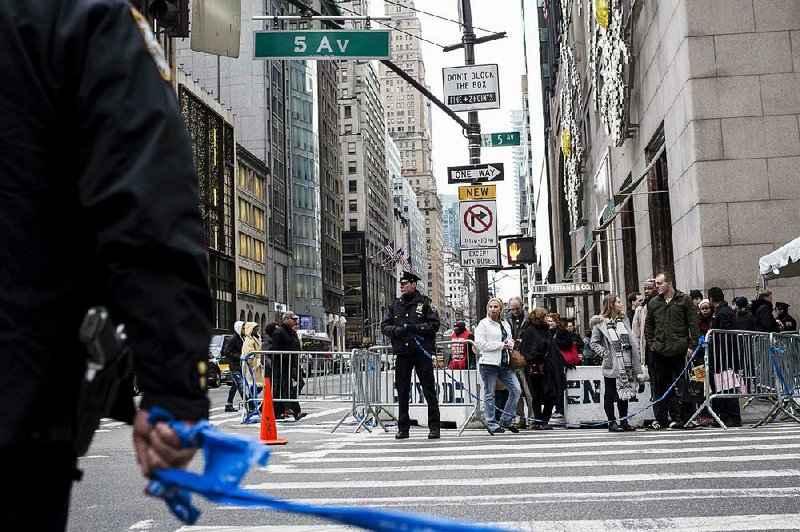New York City reopened a lane on West 56th Street near Trump Tower to crosstown traffic as police try to balance protecting the president-elect's residence and allowing more movement in the area for vehicles, pedestrians and local businesses.
The move, coordinated with the U.S. Secret Service and the city's Department of Transportation, followed weeks of reports that the presence of metal blockades, heavily armed guards and crowds of tourists and demonstrators since the election had reduced sales at neighboring luxury retailers, including Tiffany & Co., Gucci and Prada.
Police have had a full-time presence outside the tower since Donald Trump became the Republican nominee in July. It's intensified since he was elected, with unmarked cars and plainclothes officers.
The security at 57th Street and Fifth Avenue, one of the busiest intersections in the city, has constricted traffic during the holiday season in a year when the city expects a record of 60 million tourists.
[TRUMP: Timeline of president-elect’s career + list of appointments so far]
"The safety of New Yorkers and of the President-Elect are our top concern," Mayor Bill de Blasio said in a statement. "We will continue to examine and carefully confront the challenges presented by this unprecedented responsibility."
The cost of security and its impact on traffic has become a contentious issue between the Democratic mayor of the most populous U.S. city and the team supporting the Republican president-elect. The closing of 56th Street caused eastbound travel times on West 57th Street between Seventh and Fifth avenues to increase more than 20 percent in November, according to the city's transportation department.
Tiffany's flagship store, which has an entrance next to Trump Tower, could see customer visits cut in half because of the security, Cowen & Co. analyst Oliver Chen said in a note last month.
"These changes will normalize the commercial activity on the block and will ensure that small businesses on 56th Street will not become a casualty of the Trump presidency," said Councilman Daniel Garodnick, a Democrat whose district includes Manhattan's midtown.
Security costs surrounding the building have been averaging about $500,000 a day, the mayor has said. A city request for $35 million in federal reimbursement to cover the period between Trump's Nov. 8 election and his Jan. 20 inauguration was rebuffed earlier this month, when a proposed Republican congressional spending plan included just $7 million.
De Blasio has said he's confident the city will be compensated for its costs, just as it has been when hosting events such as the 2004 Republican National Convention or each year's convening of the United Nations General Assembly.
Trump Tower is one of at least a dozen buildings and complexes that carry the family name. High-profile properties in Manhattan include a 72-story tower near the United Nations, a building on Wall Street and hotels at the southern tip of Central Park West and in Soho.
In November, workers removed the Trump name from three buildings on Manhattan's Upper West Side after more than 500 residents signed a petition seeking a more "neutral building identity."
The jittery atmosphere manifested itself Tuesday, when a report of a suspicious package forced evacuation of the building's lobby, only to be given an all-clear at about 5 p.m. by the New York Police Department bomb squad, which examined an unattended backpack and found it contained children's toys. Trump was at his Mar-a-Lago estate in southern Florida at the time.
The incident, and the underlying tension over the burden of providing security, also touched off a rancorous Twitter exchange between de Blasio press secretary Eric Phillips, and members of Trump's staff.
After soon-to-be White House press secretary Sean Spicer thanked police, Phillips answered, "No problem. We'll send you the bill." Trump communications director Dan Scavino reacted by describing Phillips as an "embarrassment," to which Phillips responded, "But about that bill ... work on it with us?"
A Section on 12/29/2016

